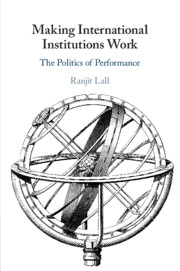
-
Select format
-
- Publisher:
- Cambridge University Press
- Publication date:
- February 2023
- February 2023
- ISBN:
- 9781009216265
- 9781009216289
- 9781009216241
- Dimensions:
- (229 x 152 mm)
- Weight & Pages:
- 0.74kg, 394 Pages
- Dimensions:
- (229 x 152 mm)
- Weight & Pages:
- 0.568kg, 394 Pages
You may already have access via personal or institutional login
Book description
International institutions are essential for tackling many of the most urgent challenges facing the world, from pandemics to humanitarian crises, yet we know little about when they succeed, when they fail, and why. This book proposes a new theory of institutional performance and tests it using a diverse array of sources, including the most comprehensive dataset on the topic. Challenging popular characterizations of international institutions as 'runaway bureaucracies,' Ranjit Lall argues that the most serious threat to performance comes from the pursuit of narrow political interests by states – paradoxically, the same actors who create and give purpose to institutions. The discreet operational processes through which international bureaucrats cultivate and sustain autonomy vis-à-vis governments, he contends, are critical to making institutions 'work.' The findings enhance our understanding of international cooperation, public goods, and organizational behavior while offering practical lessons to policymakers, NGOs, businesses, and citizens interested in improving institutional effectiveness.
Reviews
‘A fascinating book that stands much of the conventional wisdom on what makes for effective international governance on its head. Ranjit Lall has written a deeply original and meticulously researched book that sets the standard for future work in this area.'
Dani Rodrik - Harvard University
‘Ranjit Lall's original and persuasive argument is that institutional performance depends on linkages to transnational networks and deep engagement with civil society, which enhance policy autonomy and limit state interference. All serious students of international institutions should read this book.'
Robert O. Keohane - Princeton University
‘… a welcome reminder that performance of IIs has varied greatly: many IIs have also succeeded in performing important tasks that make the world a better place.’
Felicity Vabulas Source: The Review of International Organizations
‘Scholars, students, and general readers alike will highly appreciate this theory-guided empirical research. Furthermore, the book lays the groundwork for new ways of thinking and understanding institutional performance.’
Yves Steinebach Source: Perspectives on Politics
‘… this impressive book embodies an important step towards greater appreciation of the promises and the limits of cooperating through international institutions.’
Herman T. Salton Source: International Affairs
Contents
Metrics
Altmetric attention score
Full text views
Full text views help Loading metrics...
Loading metrics...
* Views captured on Cambridge Core between #date#. This data will be updated every 24 hours.
Usage data cannot currently be displayed.
Accessibility standard: Unknown
Why this information is here
This section outlines the accessibility features of this content - including support for screen readers, full keyboard navigation and high-contrast display options. This may not be relevant for you.
Accessibility Information
Accessibility compliance for the PDF of this book is currently unknown and may be updated in the future.


